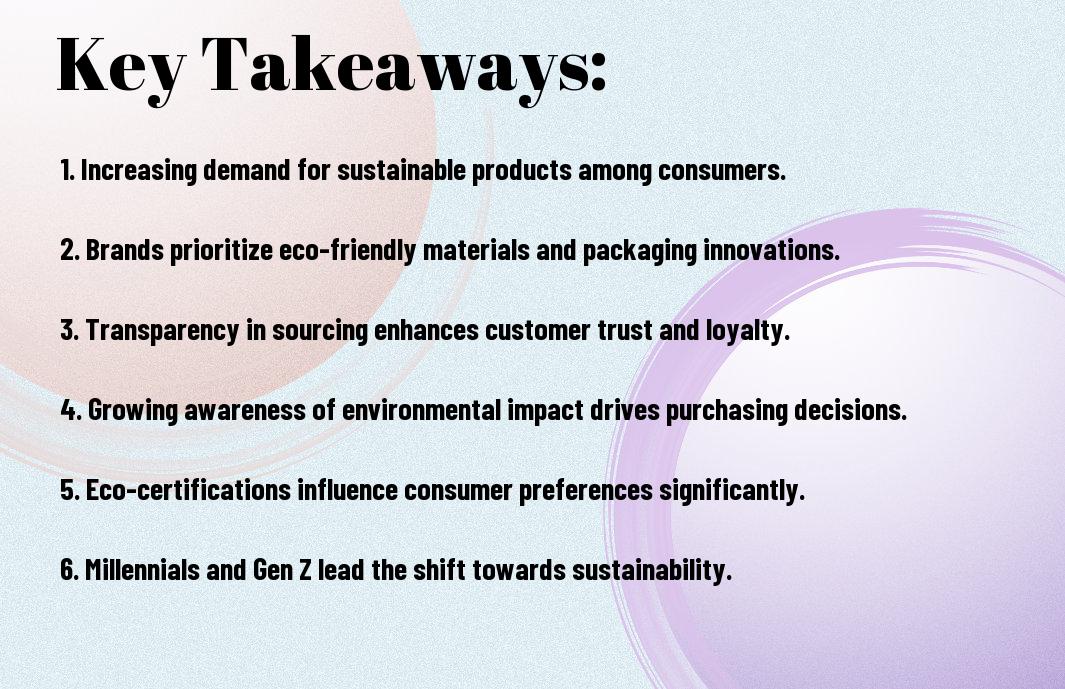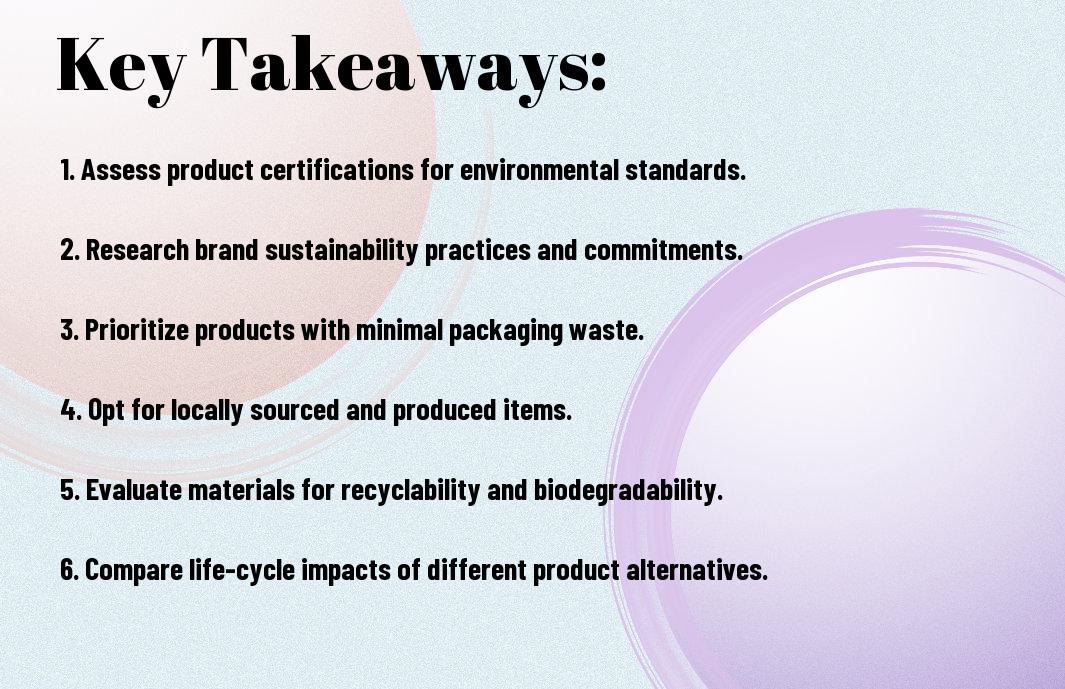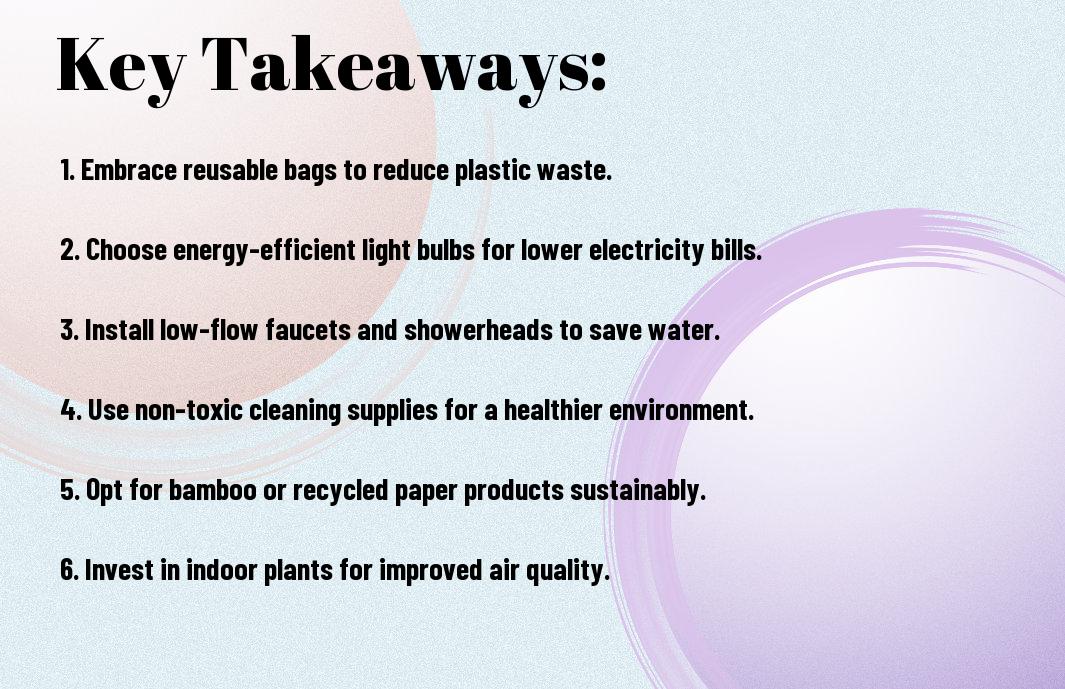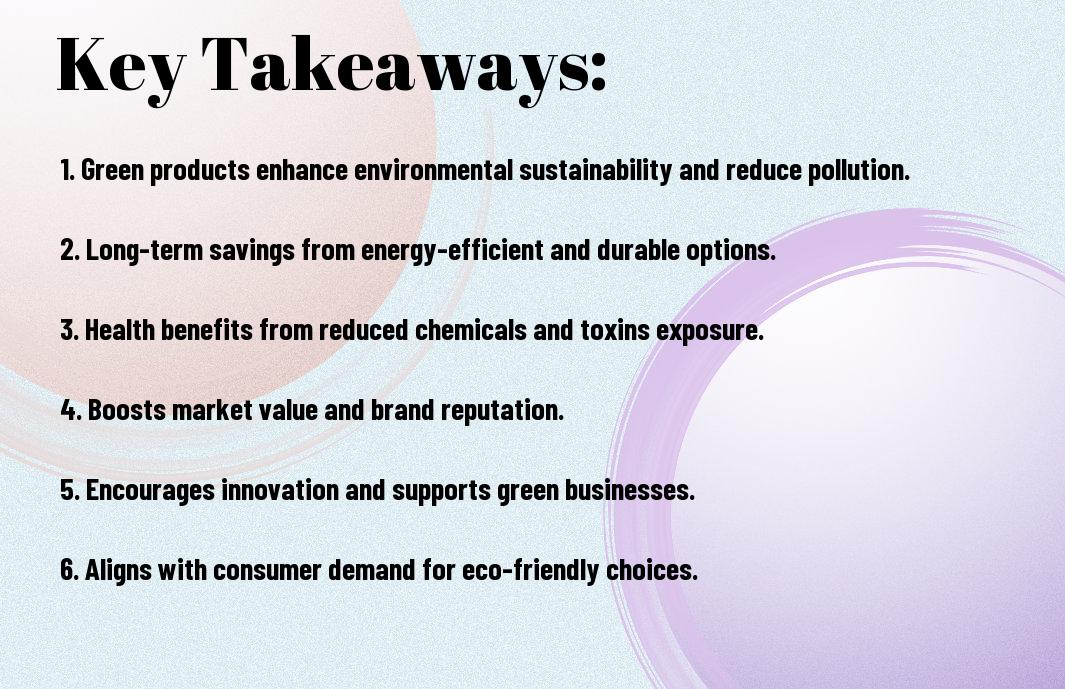You’re taking the first step towards a more sustainable lifestyle, and your choices can make a significant impact. As you explore eco-friendly options, you’ll find numerous products that can help reduce your carbon footprint. For a comprehensive guide, visit 48 Eco Friendly Products to Buy Today to Stop Plastic Waste to discover simple swaps for a greener tomorrow, starting with your daily habits and product choices.
Key Takeaways:
To adopt a more sustainable lifestyle, consider the following eco-friendly products:
- Invest in reusable bags and containers to reduce plastic waste and promote zero-waste living.
- Switch to energy-efficient appliances and LED light bulbs to minimize carbon footprint and reduce energy consumption.
- Choose organic and non-toxic cleaning products to maintain a healthy home environment and protect the environment.
- Opt for sustainable fashion by purchasing second-hand clothing and accessories, and support eco-friendly brands that use recycled materials.
- Incorporate air-purifying plants and natural air fresheners into your home to improve indoor air quality and promote a healthy living space.
Why Go Green
The decision to adopt a sustainable lifestyle is a significant one, and it’s imperative to understand the reasons behind it. You can contribute to a healthier planet and improve your own well-being by making eco-friendly choices. This chapter will explore the benefits of going green and how you can make a positive impact.
Benefits for the Environment
Between the alarming rates of pollution and climate change, it’s clear that your actions can make a difference. You can help reduce your carbon footprint and preserve natural resources by choosing green products and practices.
Benefits for Your Health
By making sustainable choices, you can create a healthier living space and reduce your exposure to harmful chemicals. You’ll be protecting your well-being and that of your loved ones.
And as you continue on this path, you’ll notice the positive effects on your physical and mental health. Your home will be free from toxic substances, and you’ll be supporting companies that prioritize the environment, which can give you peace of mind and a sense of fulfillment, allowing you to live a happier, healthier life.
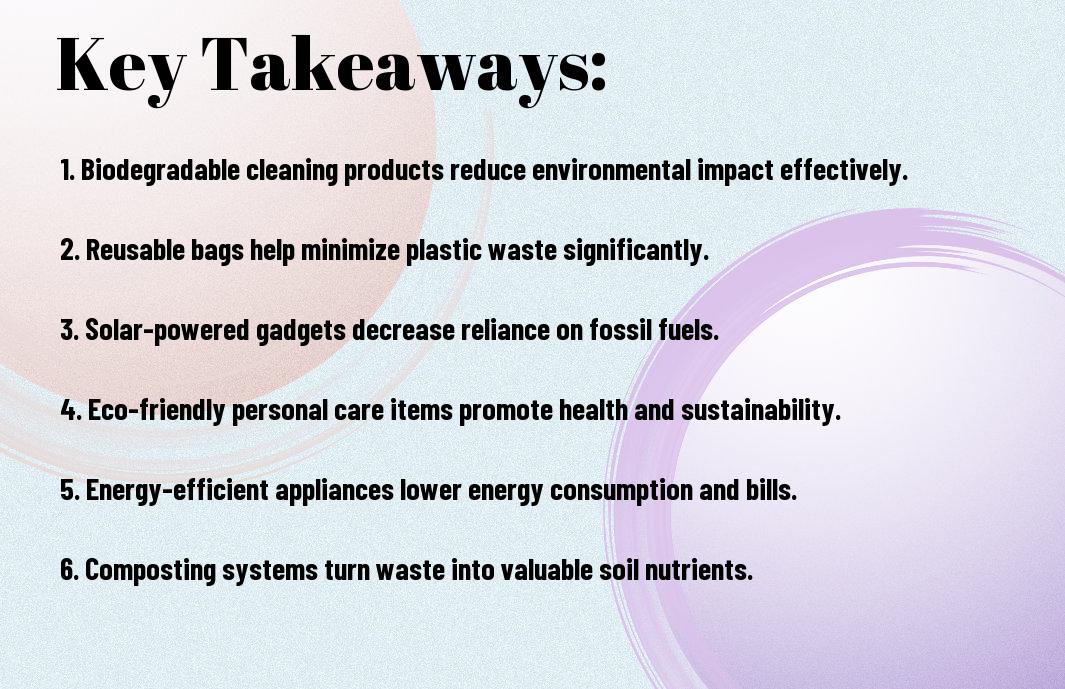
Top Eco-Friendly Products
There’s a wide range of eco-friendly products available to help you transition to a sustainable lifestyle. You can find products that are made from recycled materials, biodegradable, or have minimal packaging. These products are designed to reduce your environmental footprint and promote a healthier planet.
Renewable Energy Solutions
Backing renewable energy sources, you can harness the power of solar and wind energy to power your home. You can invest in solar panels or wind turbines to reduce your reliance on fossil fuels and lower your carbon emissions.
Sustainable Household Items
With a few simple changes, you can make your household more sustainable. You can switch to energy-efficient light bulbs, use reusable bags and containers, and choose eco-friendly cleaning products. These small changes can make a big impact on your environmental footprint.
It is interesting to note that sustainable household items are not only good for the environment, but they can also save you money in the long run. You can invest in products that are durable and long-lasting, reducing the need for frequent replacements and waste. By making these changes, you can create a more sustainable home and contribute to a healthier planet.
Green Transportation
Once again, you have the power to make a significant impact on the environment with your transportation choices. By opting for eco-friendly options, you can reduce your carbon footprint and contribute to a sustainable future.
Electric and Hybrid Vehicles
At this point, you may be considering electric and hybrid vehicles as a viable option for your daily commute. You can explore various models that offer impressive fuel efficiency and reduced emissions, making them an attractive choice for your green transportation needs.
Alternative modes of transportation
Any time you can, you should consider alternative modes of transportation, such as cycling or walking, for shorter distances. You will not only reduce your carbon footprint but also improve your physical health and wellbeing.
Also, as you explore alternative modes of transportation, you may discover that public transport, carpooling, or using ride-sharing services can be convenient and environmentally friendly options. You can use online platforms to find carpooling partners or track public transport schedules, making it easier for you to adopt sustainable transportation habits that benefit both you and the environment.

Sustainable Food Options
Not only does sustainable food help your health, but it also benefits the environment. You can make a difference by choosing eco-friendly food options, reducing your carbon footprint, and supporting sustainable farming practices.
Organic Farming
Around your community, you can find organic farms that promote sustainable agriculture, reducing the use of harmful chemicals and pesticides, and you can support them by buying their produce, which is better for your health and the environment.
Reducing Food Waste
For your part in reducing waste, you can start by planning your meals, using up leftovers, and composting food scraps, which will help decrease the amount of waste that ends up in landfills and minimize your environmental impact.
In fact, reducing food waste is a simple yet effective way to live more sustainably, and you can take it a step further by getting creative with your cooking, using up every part of the ingredient, and preserving food for later use, which will not only reduce waste but also save you money and time in the long run.
Eco-Friendly Home Improvements
All aspects of your home can be improved to make it more eco-friendly, reducing your environmental footprint and creating a healthier living space. You can start by assessing your current energy usage and looking for ways to reduce it.
Energy-Efficient Appliances
Only by choosing energy-efficient appliances can you significantly reduce your energy consumption. You will find a variety of options available, from refrigerators to air conditioners, that are designed to use less energy while providing the same level of performance.
Sustainable Building Materials
By opting for sustainable building materials, you can reduce the environmental impact of your home improvement projects. You will have the opportunity to choose from a range of materials, such as bamboo, reclaimed wood, and low-VOC paints, that are better for the environment.
But as you explore sustainable building materials, you will discover that the benefits extend beyond the environmental advantages. You will also find that these materials can improve the air quality in your home, reduce maintenance costs, and even increase the value of your property, making your home a healthier and more sustainable place to live.
Simple Changes for a Big Impact
Now that you’re considering a more sustainable lifestyle, it’s time to explore simple changes that can make a significant difference in your daily life. You can start by incorporating eco-friendly products and habits into your routine, which will not only benefit the environment but also improve your overall well-being.
Reducing Plastic Use
To take the first step towards a more sustainable lifestyle, you can begin by reducing your plastic use. You can start by using reusable bags, water bottles, and coffee cups, which will significantly decrease the amount of plastic waste you generate.
Conserving Water
Around your home, you can take small steps to conserve water, such as fixing leaks and installing low-flow fixtures, which will help you save this precious resource. You can also make a conscious effort to turn off the tap while brushing your teeth or washing your hands.
In fact, conserving water is one of the simplest and most effective ways to reduce your environmental impact. By taking shorter showers, using a water-efficient washing machine, and harvesting rainwater, you can significantly decrease your water consumption and make a positive impact on the planet. You can also consider installing greywater systems or using drought-resistant plants in your garden to further conserve water.
Conclusion
Following this guide, you can make informed decisions about the top green products for sustainable living. You will be able to choose products that align with your values and reduce your environmental footprint. By incorporating these products into your daily life, you can contribute to a more sustainable future and improve your overall well-being. Your choices will have a positive impact on the planet, and you can feel confident in your ability to make a difference.
FAQ
Q: What are some top green products for reducing plastic waste in sustainable living?
A: Some top green products for reducing plastic waste include reusable water bottles, bamboo toothbrushes, and cloth shopping bags. These products help minimize single-use plastics and can significantly reduce waste in landfills and oceans. For example, a reusable water bottle can replace hundreds of single-use plastic bottles per year, while a cloth shopping bag can be used for multiple trips to the grocery store. By incorporating these products into daily life, individuals can make a significant impact on reducing plastic waste and promoting sustainable living.
Q: How can I use eco-friendly cleaning products to support sustainable living?
A: Eco-friendly cleaning products are a great way to support sustainable living by reducing the use of harsh chemicals and toxins in the home. Some top green products for cleaning include natural all-purpose cleaners, dish soap made from plant-based ingredients, and laundry detergent that is free of phosphates and chlorine. These products are not only better for the environment, but they can also improve indoor air quality and reduce the risk of health problems. When shopping for eco-friendly cleaning products, look for certifications like EPA Safer Choice or Leaping Bunny, which ensure that the products meet rigorous standards for sustainability and safety.
Q: What are some top green products for energy efficiency in the home?
A: Some top green products for energy efficiency in the home include LED light bulbs, smart thermostats, and power strips with built-in timers. LED light bulbs use significantly less energy than traditional incandescent bulbs and can last up to 25 times longer. Smart thermostats can learn a home’s temperature preferences and adjust the temperature accordingly, reducing energy waste and saving money on utility bills. Power strips with built-in timers can be used to plug in electronics like TVs and computers, and can be set to turn off automatically when not in use, eliminating standby power consumption. By incorporating these products into daily life, individuals can reduce their energy consumption and lower their carbon footprint, supporting sustainable living and a healthier environment.

